Article from: www.thenewspaper.com/news/42/4205.asp
9/12/2013
Investors Go Negative On Toll Roads
Motorists can expect to pay more as toll roads hike rates to meet mounting debt payments.
 Driving on toll roads will continue to be a growing expense for motorists, according to a special report released Tuesday by Moody's Investors Service. The credit ratings agency keeps tabs on 42 American toll roads that collectively hold $80.2 billion in debt. Since toll road traffic remains depressed, motorists using these pay routes will have to pay higher tolls to meet the debt burden. While state and federal transportation officials remain bullish on tolling, Moody's is cautioning potential investors.
Driving on toll roads will continue to be a growing expense for motorists, according to a special report released Tuesday by Moody's Investors Service. The credit ratings agency keeps tabs on 42 American toll roads that collectively hold $80.2 billion in debt. Since toll road traffic remains depressed, motorists using these pay routes will have to pay higher tolls to meet the debt burden. While state and federal transportation officials remain bullish on tolling, Moody's is cautioning potential investors.
"Moody's outlook for the US toll road sector remains negative in 2013," the analysts noted. "Our February 2013 US Toll Roads Outlook report noted that negative credit pressures continue to outweigh the positives."
The average toll increased 7.7 percent between 2011 and 2012, well above the 2.1 percent inflation rate for the year. The primary cause was the jump in average debt from $14.3 million per roadway mile in 2011 to $18.9 million.
"Steady toll rate increases will be necessary to support a growing debt burden, and the unfettered ability to increase toll rates could face mounting political pressure in a slowly growing economy," the report stated.
Moody's fears weakening economic prospects, including the possibility of recession in 2013, will continue to cloud the prospects for successful projects. When money and jobs are scarce, the number of individuals willing and able to continue throwing coins into the basket during the daily commute will continue to dwindle. This creates the potential to further drive down toll road usage with higher prices.
"We expect that rising toll rates and a sluggish economic recovery will continue to keep traffic volumes somewhat flat," the report explains. "Rising fuel prices also could constrain future traffic growth, particularly if gas at the pumps rises above $4 a gallon for per protracted period."
The report predicts these factors will not influence political leaders who will approve more tolling projects for the foreseeable future. Moody's notes that state and local officials increasingly are dispensing with the notion that tolls are user fees by diverting "excess cash flows" from toll roads to "subsidize their own capital and operating needs." The Dulles Toll Road in Virginia, for example, raised rates significantly to fund an unrelated $6 billion Metrorail project.
Source: US Toll Road Sector Medians for Fiscal Year 2012 (Moodys Investors Service, 9/10/2013)
Permanent Link for this item
Return to Front Page
 Driving on toll roads will continue to be a growing expense for motorists, according to a special report released Tuesday by Moody's Investors Service. The credit ratings agency keeps tabs on 42 American toll roads that collectively hold $80.2 billion in debt. Since toll road traffic remains depressed, motorists using these pay routes will have to pay higher tolls to meet the debt burden. While state and federal transportation officials remain bullish on tolling, Moody's is cautioning potential investors.
Driving on toll roads will continue to be a growing expense for motorists, according to a special report released Tuesday by Moody's Investors Service. The credit ratings agency keeps tabs on 42 American toll roads that collectively hold $80.2 billion in debt. Since toll road traffic remains depressed, motorists using these pay routes will have to pay higher tolls to meet the debt burden. While state and federal transportation officials remain bullish on tolling, Moody's is cautioning potential investors.